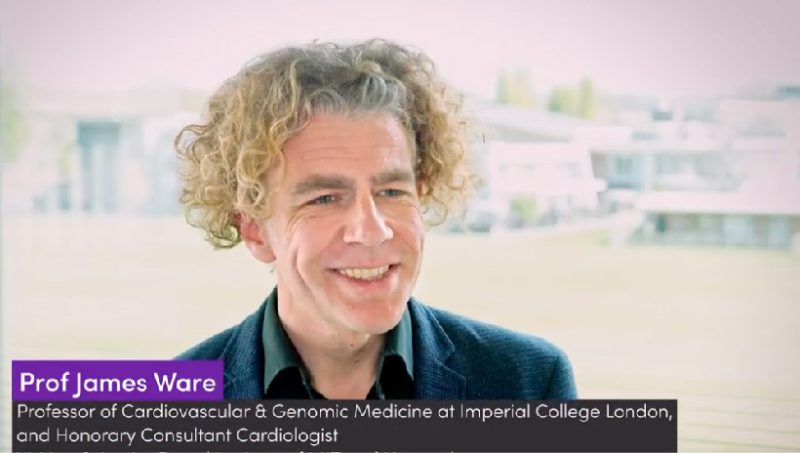Professor James Ware Awarded Grant to Revolutionise Rare Cases
By LMS Staff Member
July 6, 2023
Time to read: 4 minutes
In one of the UK’s biggest leaps towards treating rare diseases, the Medical Research Council (MRC) and the National Institute for Health and Care Research (NIHR) have committed a remarkable £14 million to the UK Rare Disease Research Platform.
Recognising the immense challenge of combatting rare diseases, the UK Rare Disease Research Platform aims to unite the nation’s foremost experts in the field to drive innovative advancements in treatments that have the potential to transform lives. The funding will be distributed across eleven nodes located at various UK universities, fostering collaboration and knowledge sharing amongst leading experts of rare disease.
Leading the Rare Heart Disease hub within the platform is Professor James Ware leader of the MRC LMS Cardiovascular Genomics and Precision Medicine Group, and researcher at Imperial College’s National Heart and Lung Institute. Undetected and untreated, rare heart diseases such as cardiomyopathy can lead to sudden cardiac death. He will be leading the Rare Heart Disease Hub along with Dr Tom Lumbers for UCL, Dr Kate Thomson from Oxford University, and Prof Cathie Sudlow from BHF Data Science Centre, HDRUK.
Leveraging his expertise as a prominent cardiologist and researcher, Professor Ware and his team intend to utilise the investment to address the underlying genetic challenges associated with rare inherited heart diseases.
The funding will facilitate platforms similar to The Heart Hive, which fosters engagement between patients with rare heart diseases and ongoing research.
Professor James Ware and his team are experts who aim to use this investment in understanding genetic challenges associated with rare inherited heart diseases.
Professor James Ware emphasised,
“Inherited Cardiovascular Conditions (ICCs) pose a significant health challenge. While individually uncommon, they collectively affect over 300,000 people in the UK, encompassing the most common causes of sudden death in young adults and leading reasons for heart transplantation. I am thrilled that the NIHR and MRC have acknowledged this and included a dedicated Cardiovascular node within this platform as part of the national rare disease research strategy.”
While individually uncommon, they collectively affect over 300,000 people in the UK, encompassing the most common causes of sudden death in young adults and leading reasons for heart transplantation.
This investment will cultivate further collaborations between Professor Ware’s team and organisations such as the NHS Genomic Medicine Service, NHS England, Genomics England, and the British Heart Foundation Data Science Centre, enabling the secure compilation of valuable patient trial data. This data will support other exceptional researchers working tirelessly to discover new treatments for rare heart diseases.

The Heart Hive brings together people with rare heart diseases with researchers to advance research and save lives
Professor James Ware elaborated,
“Many of the most pressing challenges we face require large-scale studies that can only be accomplished through a national approach, given the rarity of these conditions. The UK’s National Genomic Medicine Service offers tremendous research potential, and this newfound funding will allow us to seize this opportunity by extending research invitations to every NHS patient affected by cardiovascular rare diseases. By connecting national data resources in a secure research environment, we will tackle challenges that surpass the reach of individual researchers and traditional collaborative networks, are tractable to a national platform that enjoys the trust and support of the research community.”

Building upon their advocacy during The Global Heart Hub’s Cardiomyopathy Awareness Week, the launch of the Heart Hive, and rare heart disease research, Professor James Ware and his team aspire to utilise the awarded funding to continue their pursuit of personalized prevention and treatment options for rare heart diseases, potentially saving countless lives.
Professor John Iredale, MRC Executive Chair, highlighted the significance of the platform, stating,
“Although these diseases are diverse and have various causes, they often present common challenges in researching disease mechanisms, diagnosis, management, and treatment. The platform will bring together individuals, linking them to resources and activities in the UK and internationally, while supporting projects that drive advances in rare disease research.”
The platform will bring together individuals, linking them to resources and activities in the UK and internationally, while supporting projects that drive advances in rare disease research.
Congratulations to the universities which have been prized with this funding as well including King’s College London, UCL, Swansea University, and The University of Nottingham. Together, we can treat even the rarest of diseases.
Read more: